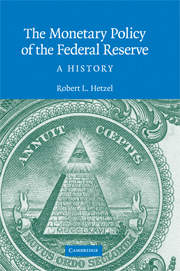Book contents
- Frontmatter
- Contents
- Figures
- Preface
- 1 The Pragmatic Evolution of the Monetary Standard
- 2 Learning and Policy Ambiguity
- 3 From Gold to Fiat Money
- 4 From World War II to the Accord
- 5 Martin and Lean-against-the-Wind
- 6 Inflation Is a Nonmonetary Phenomenon
- 7 The Start of the Great Inflation
- 8 Arthur Burns and Richard Nixon
- 9 Bretton Woods
- 10 Policy in the Ford Administration
- 11 Carter, Burns, and Miller
- 12 The Political Economy of Inflation
- 13 The Volcker Disinflation
- 14 Monetary Policy after the Disinflation
- 15 Greenspan's Move to Price Stability
- 16 International Bailouts and Moral Hazard
- 17 Monetary Policy Becomes Expansionary
- 18 Departing from the Standard Procedures
- 19 Boom and Bust: 1997 to 2001
- 20 Backing Off from Price Stability
- 21 The Volcker–Greenspan Regime
- 22 The Fed: Inflation Fighter or Inflation Creator?
- 23 The Stop–Go Laboratory
- 24 Stop–Go and Interest Rate Inertia
- 25 Monetary Nonneutrality in the Stop–Go Era
- 26 A Century of Monetary Experiments
- Appendix: Data Seen by FOMC for the Stop–Go Period Shown in Figures 24.1, 24.2, and 24.3
- Notes
- Bibliography
- Index
- Titles in the series
1 - The Pragmatic Evolution of the Monetary Standard
Published online by Cambridge University Press: 26 May 2010
- Frontmatter
- Contents
- Figures
- Preface
- 1 The Pragmatic Evolution of the Monetary Standard
- 2 Learning and Policy Ambiguity
- 3 From Gold to Fiat Money
- 4 From World War II to the Accord
- 5 Martin and Lean-against-the-Wind
- 6 Inflation Is a Nonmonetary Phenomenon
- 7 The Start of the Great Inflation
- 8 Arthur Burns and Richard Nixon
- 9 Bretton Woods
- 10 Policy in the Ford Administration
- 11 Carter, Burns, and Miller
- 12 The Political Economy of Inflation
- 13 The Volcker Disinflation
- 14 Monetary Policy after the Disinflation
- 15 Greenspan's Move to Price Stability
- 16 International Bailouts and Moral Hazard
- 17 Monetary Policy Becomes Expansionary
- 18 Departing from the Standard Procedures
- 19 Boom and Bust: 1997 to 2001
- 20 Backing Off from Price Stability
- 21 The Volcker–Greenspan Regime
- 22 The Fed: Inflation Fighter or Inflation Creator?
- 23 The Stop–Go Laboratory
- 24 Stop–Go and Interest Rate Inertia
- 25 Monetary Nonneutrality in the Stop–Go Era
- 26 A Century of Monetary Experiments
- Appendix: Data Seen by FOMC for the Stop–Go Period Shown in Figures 24.1, 24.2, and 24.3
- Notes
- Bibliography
- Index
- Titles in the series
Summary
The twentieth century was marked by vast, horrific disasters as well as by widespread, beneficent progress. In the first half of the century, two world wars almost ended Western civilization. In the second half, democracy spread and living standards rose. Throughout, monetary instability interacted with social upheaval and political disorder. Inflation and deflation created feelings of powerlessness in the face of impersonal forces that promoted a search for scapegoats. Hyperinflation and depression contributed to the rise of Nazism in Germany. The stability of the deutsche mark then accompanied the German postwar growth miracle (Hetzel 2002a; 2002b).
In the United States, deflation and depression in the 1930s produced a decade of untold human misery. The Great Inflation of the 1970s spawned wage and price controls, which trampled on due process. The feeling of government's loss of control, symbolized by gas lines, helped propel Ronald Reagan into power. After Paul Volcker led the Fed to accept responsibility for inflation in 1979, an increase in monetary stability accompanied an increase in economic stability.
The success of the twenty-first century will depend upon how well societies learn the lessons of the twentieth century. The grand monetary experiment of the last century was the replacement of a gold standard with a fiat money standard. The failure of central banks to understand their new responsibility to provide a nominal anchor for prices lay at the heart of the spectacular monetary failures of that century.
- Type
- Chapter
- Information
- The Monetary Policy of the Federal ReserveA History, pp. 1 - 5Publisher: Cambridge University PressPrint publication year: 2008



